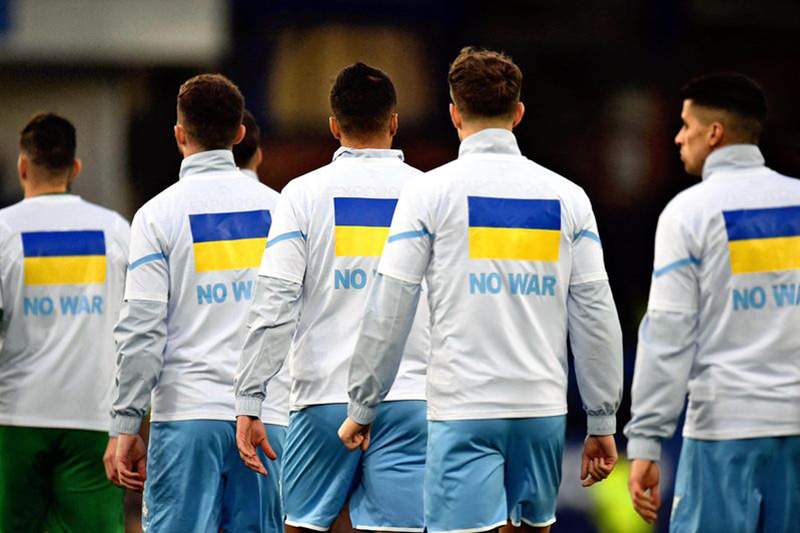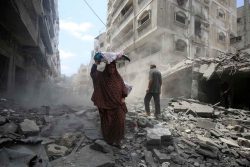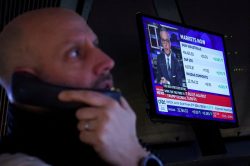
Players and others wear shirts with anti-war messages before a match between Everton and Manchester City.
16:30 JST, March 5, 2022
Moves to exclude Russian teams and athletes from sports have accelerated following the country’s invasion of Ukraine.
Several international sports federations have not only canceled competitions in Russia, but have also banned athletes from Russia and its ally Belarus from participating in tournaments held elsewhere.
The International Paralympic Committee had previously said athletes from these countries could compete at the Beijing Winter Paralympics as individuals, but on Thursday it decided they would not be allowed to take part at all.
Expression of solidarity
In a statement released Thursday, the IPC said it changed course because some national and regional Paralympic committees and athletes were threatening to pull out of the Games, putting the entire competition at risk.
This reconsideration of a policy after an outcry has already been seen in soccer. Ukrainian players received a big round of applause before the start of a match between Everton and Manchester City in the English Premier League on Feb. 26.
Fans waved banners in support for Ukraine and many of the players wore shirts emblazoned with Ukrainian flags and the message, “No war.”
A league official said there was a need for a statement of unity.
The European soccer world reacted quickly after the invasion of Ukraine began on Feb. 24. The Union of European Football Associations (UEFA) decided on Feb. 25 that home games against Russian and Ukrainian clubs would be held on neutral ground.
On Feb. 27, FIFA banned international matches in Russia and on Feb. 28 both associations barred the Russian national team and Russian clubs from participating in tournaments.
They will also be kept out of major events such as the men’s and women’s World Cup and the European Football Championships.
Responding to public opinion
Against a backdrop of these sanctions, the response from sporting associations and athletes has been strong.
The Polish Football Association, whose national team was scheduled to face Russia in a World Cup qualifier on March 24, said it would refuse to play and criticized FIFA’s initial response to let Russia compete under the name “Football Union of Russia.”
Robert Lewandowski, a forward on the Polish national team, said on Twitter: “I can’t imagine playing a match with the Russian National Team in [this] situation…[We] can’t pretend that nothing is happening.”
Polish goalie Wojciech Szczesny said that even if the side had to forfeit, it would have been the right choice.
The soccer associations of Sweden, the Czech Republic and England, which might face Russia at the European Women’s Championship this summer, have taken similar stances.
In the 1990s, FIFA and UEFA banned Yugoslavia from international tournaments after the United Nations imposed sanctions on the country because of its civil war. A FIFA official said that while the present situation is different, “A strong response demonstrating the solidarity of the international community and the soccer world is needed.”
Soccer in Europe has deep connections with local communities. Club teams are in some sense the “face” of their community, which is also true for the national teams. Sports federations and club teams are expected to be sensitive to public opinion and to quickly and clearly state their positions.
Sponsors back away
England’s Manchester United, one of the most powerful clubs in the world, canceled a roughly 10-year deal worth £40 million (about ¥6.2 billion) with Russian airline Aeroflot, a decision its supporters welcomed.
UEFA terminated a sponsorship agreement with Gazprom, a Russian state company, estimated to be worth €40 million (¥5.2 billion) annually.
Soccer and politics can be tightly intertwined.
In response to a decree by Russian President Vladimir Putin approving independence for two regions in eastern Ukraine, British Prime Minister Boris Johnson said it was inconceivable that Russia would host any major international soccer tournaments. He said he would demand the Champions League final not be held in St. Petersburg as scheduled, a decision that was endorsed by the British sports minister.
The British Parliament demanded the Russian owner of Chelsea Football Club, a person close to Putin, be sanctioned by seizing his assets. The owner announced that the club would be sold on March 2.
On Feb. 28, the International Olympic Committee advised the International Sports Federations to not invite athletes or officials from Russia or Belarus, giving significant momentum to the effort to exclude Russia from international sports arenas.
After being barred by the International Skating Union from participating in competitions, the Russian Figure Skating Federation said: “The decision is discriminatory. Sports are becoming an instrument of politics.”
Some Russian sports organizations have suggested bringing a case before the Court of Arbitration for Sport, though this has not slowed moves to exclude Russia.
Top Articles in World
-

Israeli Ambassador to Japan Speaks about Japan’s Role in the Reconstruction of Gaza
-

Videos Plagiarized, Reposted with False Subtitles Claiming ‘Ryukyu Belongs to China’; Anti-China False Information Also Posted in Japan
-

North Korea Possibly Launches Ballistic Missile
-

Chinese Embassy in Japan Reiterates Call for Chinese People to Refrain from Traveling to Japan; Call Comes in Wake of ¥400 Mil. Robbery
-

Russia: Visa Required for Visiting Graves in Northern Territories, Lifting of Sanctions Also Necessary
JN ACCESS RANKING
-

Japan PM Takaichi’s Cabinet Resigns en Masse
-

Japan Institute to Use Domestic Commercial Optical Lattice Clock to Set Japan Standard Time
-

Israeli Ambassador to Japan Speaks about Japan’s Role in the Reconstruction of Gaza
-

Man Infected with Measles Reportedly Dined at Restaurant in Tokyo Station
-

Videos Plagiarized, Reposted with False Subtitles Claiming ‘Ryukyu Belongs to China’; Anti-China False Information Also Posted in Japan
























